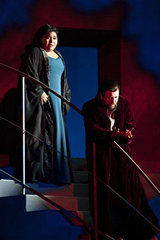| Opera Reviews | 2 May 2024 |
Gergiev fails to ignite this poorly cast Macbethby Silvia Luraghi |
|
| Verdi: Macbeth Teatro alla Scala, Milan 9 April 2013 |
|
|
The score was a mixture of the 1847 original edition and the 1865 revised version (it was based on the former, but also included the famous aria 'La luce langue' and the chorus 'Patria oppressa' from the latter); no explanation was offered for this choice. The sets constituted a gray two-storey building, which revolved showing an outside and an inside setting. It featured a terrace at the level of the second floor, and, moving to the center or the side of the stage, offered the setting for pretty much the whole action. A child wandering around with a big teddy bear during the prelude hints at a happy atmosphere, but all of a sudden the child takes out a knife, and stabs the teddy bear. Blood floods onto the building's wall, and the tragedy starts. The witches come on stage in long, shabby coats, running lightly as if they were blown by the wind, with a quite impressive movement. After they encounter Macbeth and Banco, they appear again, and then vanish leaving the scene to Lady Macbeth, who reads the letter sitting on the terrace of what now looks like her palace. The king and his company come in from the back of the orchestra stalls, and cross the theater cheering the audience, before disappearing through a side door (the whole scene was also projected on stage). Later, the terrace hosts the Lady's toast, and the appearance of Banco's ghost, and still later the three apparitions. At the opening of the fourth act, Scottish refugees receive a cup of soup before mourning over their oppressed fatherland. In spite of these compelling ideas by the production team, led by stage director Giorgio Barberio Corsetti, who also designed the sets in collaboration with Cristian Taraborrelli, the singers did not sound especially fit for this opera. Baritone Franco Vassallo in the title role sang correctly, but one had the impression that he would have been more at ease in a lighter role. At his side, soprano Lucrecia Garcia sounded really at odds with the score: she had problems in the low range, and could not control the top. This became even more evident, as the 1847 version demands a higher tessitura. Bass tefan Kocán as Banco had a throaty emission, and he, too, did not sound at ease. In the end, the best on stage turned out to be tenor Stefano Secco as Macduff. Even the chorus was far from perfect. All in all, a rather routine production that one should not see at La Scala. |
|
| Text ©
Silvia Luraghi Photo © Brescia/Amisano © Teatro alla Scala |

 Maestro
Valery Gergiev managed to fit into his busy schedule four performances
of Verdi's Macbeth at La Scala (a fifth one was cancelled because
of an untimely strike). Gergiev has not been heard conducting an opera
in Milan for about a decade, since Boris Godunov at the Teatro
degli Arcimboldi, after which he has only conducted symphonic music
in Milan. Hence, his performance was highly anticipated. Unfortunately,
he failed to impress, perhaps partly on account of his late arrival
(just before the pre-final rehearsal), and partly also due to a poor
vocal cast.
Maestro
Valery Gergiev managed to fit into his busy schedule four performances
of Verdi's Macbeth at La Scala (a fifth one was cancelled because
of an untimely strike). Gergiev has not been heard conducting an opera
in Milan for about a decade, since Boris Godunov at the Teatro
degli Arcimboldi, after which he has only conducted symphonic music
in Milan. Hence, his performance was highly anticipated. Unfortunately,
he failed to impress, perhaps partly on account of his late arrival
(just before the pre-final rehearsal), and partly also due to a poor
vocal cast. 





